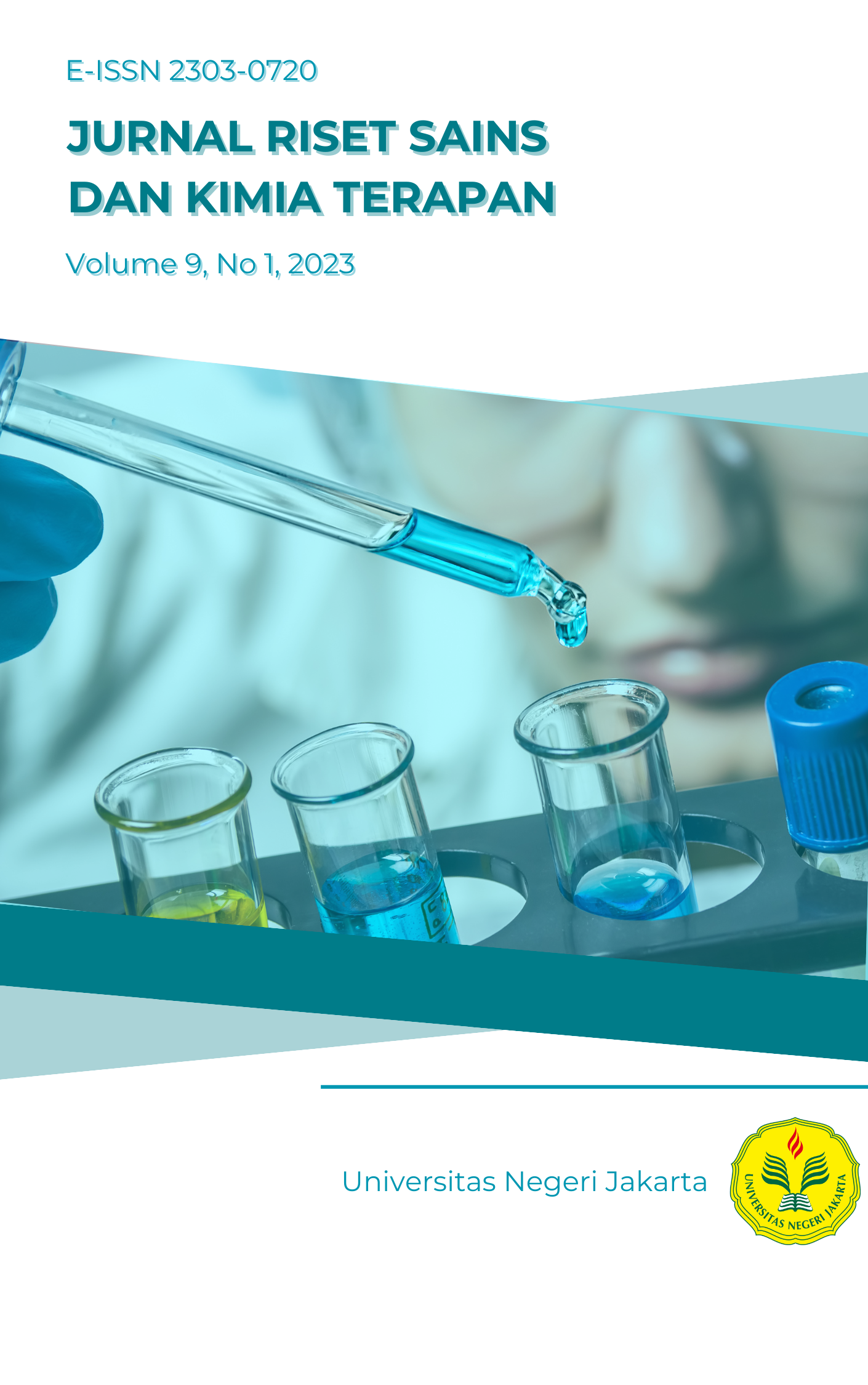Karakterisasi Minyak Hasil Pirolisis Berbahan Dasar Serut Gergaji Kayu Akasia (Acacia mangium) dengan Variasi Suhu pada Pirolisis
Abstract
Abstrak
Bahan bakar merupakan salah satu kebutuhan yang sangat penting bagi kehidupan sehari-hari dengan penggunaan yang sangat signifikan. Penelitian ini dilakukan untuk mendapatkan bahan bakar alternatif berbasis biomasa dengan metode pirolisis lambat. Pada proses pirolisis lambat menggunakan variasi suhu 250°C, 300°C, dan 350°C. Suhu optimum minyak hasil pirolisis serut gergaji kayu akasia diperoleh pada suhu 300°C. Minyak hasil pirolisis dari serut gergaji kayu akasia yang dihasilkan memiliki karakteristik fisika yakni viskositas 4,62 cSt, densitas 0,99 gram/mL, dan pH 3,53 serta mengandung komponen senyawa fenol, alkohol, keton dan senyawa asam organik. Dari senyawa komponen yang diperoleh adalah dominan mengandung senyawa fenol yang merupakan hasil degradasi lignin.
Kata kunci: GC-MS, minyak pirolisis, pirolisis
Abstract
Fuel is one of the needs that is very important for everyday life with a very significant use. This research was conducted to obtain biomass-based alternative fuels using slow pyrolysis method. The slow pyrolysis process use temperature variations of 250 °C, 300 °C, and 350 °C. The optimum temperature of the oil from the acacia sawdust pyrolysis was obtained at 300 °C. Pyrolysis oil from acacia wood saw drawnings produced has physical characteristics viscosity 4.62 cSt, density 0.99 g/mL, and pH 3.53 and contains components of phenol compounds, alcohols, ketones and organic acid. From the component obtained, phenol compounds are the result of lignin degradation.
Keywords: GC-MS, pyrolysis oil, pyrolysis
References
Ahmed, A., Bakar, M. S. A., Razzaq, A., Hidayat, S., Jamil, F., Amin, M. N., Sukri, R. S., Shah, N. S., & Park, Y.-K. (2021). Characterization and Thermal Behavior Study of Biomass from Invasive Acacia mangium Species in Brunei Preceding Thermochemical Conversion. Sustainability, 13(9), 5249. https://doi.org/10.3390/su13095249
Ain, Q., Shafiq, M., Capareda, S. C., & Bareen, F. (2021). Effect of different temperatures on the properties of pyrolysis products of Parthenium hysterophorus. Journal of Saudi Chemical Society, 25(3), 101197. https://doi.org/10.1016/j.jscs.2021.101197
Chen, Z., Wang, Y., Cheng, H., & Zhou, H. (2022). Hemicellulose degradation: An overlooked issue in acidic deep eutectic solvents pretreatment of lignocellulosic biomass. Industrial Crops and Products, 187, 115335. https://doi.org/10.1016/j.indcrop.2022.115335
Deendarlianto, D., Widyaparaga, A., Widodo, T., Handika, I., Chandra Setiawan, I., & Lindasista, A. (2020). Modelling of Indonesian road transport energy sector in order to fulfill the national energy and oil reduction targets. Renewable Energy, 146, 504–518. https://doi.org/10.1016/j.renene.2019.06.169
Duong, V. M., Flener, U., Hrbek, J., & Hofbauer, H. (2022). Emission characteristics from the combustion of Acacia Mangium in the automatic feeding pellet stove. Renewable Energy, 186, 183–194. https://doi.org/10.1016/j.renene.2021.12.152
Gao, A., Zou, K., Wang, Y., Gao, G., Penzik, M. V., Kozlov, A. N., Isa, Y. M., Huang, Y., & Zhang, S. (2023). The core factors in determining product distributions during pyrolysis: The synergistic effect of volatile-char interactions and temperature. Renewable Energy, 218, 119359–119359. https://doi.org/10.1016/j.renene.2023.119359
Gevorgyan, A., Hopmann, K. H., & Bayer, A. (2021). Lipids as versatile solvents for chemical synthesis. Green Chemistry, 23(18), 7219–7227. https://doi.org/10.1039/d1gc02311j
Jie, X., Gonzalez-Cortes, S., Xiao, T., Yao, B., Wang, J., Slocombe, D. R., Fang, Y., Miller, N., Al-Megren, H. A., Dilworth, J. R., Thomas, J. M., & Edwards, P. P. (2019). The decarbonisation of petroleum and other fossil hydrocarbon fuels for the facile production and safe storage of hydrogen. Energy & Environmental Science, 12(1), 238–249. https://doi.org/10.1039/c8ee02444h
Khare, A., He, Q., & Batta, R. (2019). Predicting gasoline shortage during disasters using social media. OR Spectrum, 42. https://doi.org/10.1007/s00291-019-00559-8
Milewska, B., & Milewski, D. (2022). Implications of Increasing Fuel Costs for Supply Chain Strategy. Energies, 15(19), 6934. https://doi.org/10.3390/en15196934
Mishra, R. K., & Mohanty, K. (2022). Pyrolysis of low-value waste sawdust over low-cost catalysts: physicochemical characterization of pyrolytic oil and value-added biochar. Biofuel Research Journal, 9(4), 1736–1749. https://doi.org/10.18331/brj2022.9.4.4
Mong, G. R., Chong, C. T., Chong, W. W. F., Ng, J.-H., Ong, H. C., Ashokkumar, V., Tran, M.-V., Karmakar, S., Goh, B. H. H., & Mohd Yasin, M. F. (2022). Progress and challenges in sustainable pyrolysis technology: Reactors, feedstocks and products. Fuel, 324, 124777. https://doi.org/10.1016/j.fuel.2022.124777
Rahman, A., Dargusch, P., & Wadley, D. (2021). The political economy of oil supply in Indonesia and the implications for renewable energy development. Renewable and Sustainable Energy Reviews, 144, 111027. https://doi.org/10.1016/j.rser.2021.111027
Suciu, L. G., Griffin, R. J., & Masiello, C. A. (2021). A zero-dimensional view of atmospheric degradation of levoglucosan (LEVCHEM_v1) using numerical chamber simulations. Geoscientific Model Development, 14(2), 907–921. https://doi.org/10.5194/gmd-14-907-2021
Zhang, F., Zhang, S., Chen, L., Liu, Z., & Qin, J. (2020). Utilization of bark waste of Acacia mangium: The preparation of activated carbon and adsorption of phenolic wastewater. Industrial Crops and Products, 160, 113157. https://doi.org/10.1016/j.indcrop.2020.113157
Copyright (c) 2023 JRSKT - Jurnal Riset Sains dan Kimia Terapan

This work is licensed under a Creative Commons Attribution 4.0 International License.


_1.png)


